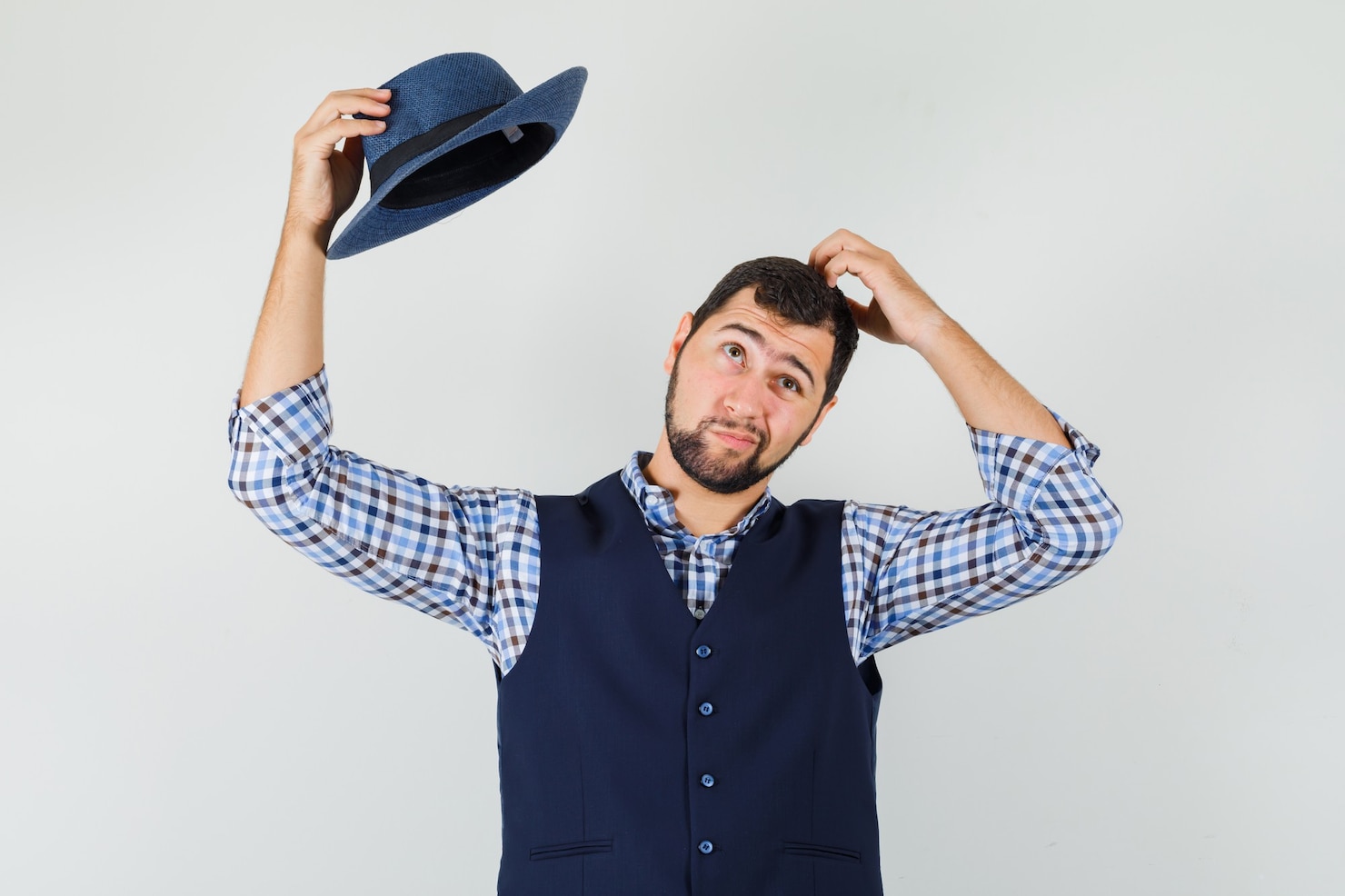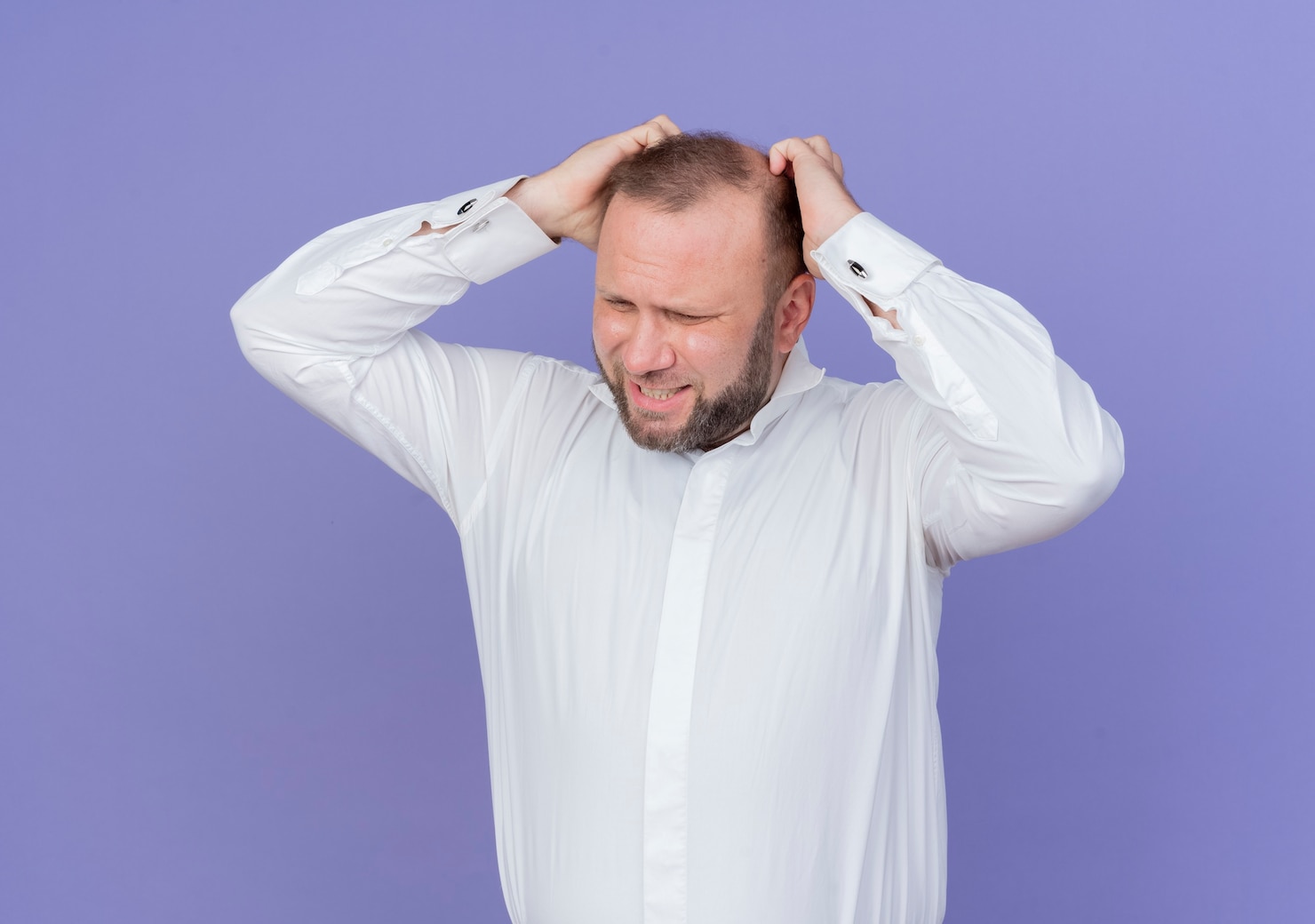
Many men have wondered if wearing a hat regularly leads to hair thinning or baldness. This is evident in the rising searches for terms like “Does wearing a hat cause hair loss?” and “Can wearing a hat cause hair loss?” online.
This article will delve into the scientific facts behind hair growth, discuss the factors that can contribute to hair loss, and provide valuable tips for maintaining healthy hair. We will also explore the truth about hat-related hair loss so you can get reliable, science-backed answers to questions like “Does wearing hat cause hair loss?” and “Does wearing a hat backwards cause hair loss?”
Let's separate fact from fiction and empower you with knowledge about men's hair care. So, let's dive in and uncover the truth behind this intriguing question.
Debunking the Hat-Hair Loss Myth
You may have heard the common belief that wearing a hat frequently leads to hair loss. However, let's set the record straight and debunk this myth once and for all. The idea that wearing a hat directly causes hair loss is nothing more than a misconception that has been circulating for years.
Explanation of the Hat-Hair Loss Misconception
The hat-hair loss myth stems from the notion that wearing a hat restricts the scalp's ability to breathe, leading to poor circulation and ultimately hair loss. However, it's important to understand that hair loss is primarily influenced by internal factors such as genetics, hormones, and overall health, rather than external factors like hat-wearing.
Key Takeaway:
Wearing a hat does not directly cause hair loss. While a tight hat can contribute to hair breakage or traction alopecia, this is a reversible condition. Focus on maintaining a healthy lifestyle, addressing internal factors that affect hair loss, and enjoying your favorite hats without worrying about losing your precious locks.Factors That Can Affect Hair Loss

Image Source: FreePik
When it comes to hair loss, it's essential to consider various factors that can contribute to this common concern. Understanding these factors can help you take proactive steps toward maintaining healthy hair. Let's explore two key categories of factors that can influence hair loss: genetic predisposition and hormonal factors, as well as environmental and lifestyle factors.
Genetic Predisposition and Hormonal Factors
Genetics play a significant role in determining your susceptibility to hair loss. If you have a family history of hair loss, particularly male or female pattern baldness, you may be more likely to experience it yourself. This genetic predisposition affects the sensitivity of your hair follicles to the hormone dihydrotestosterone (DHT). DHT is a much stronger form of testosterone that is responsible for male pattern baldness and it exerts its effect by shrinking the hair follicles, leading to shorter and finer hair strands over time, a phenomenon referred to as miniaturization.
Hormonal imbalances can also contribute to hair loss. For example, an excess of DHT in the scalp can accelerate hair thinning and balding. Hormonal fluctuations due to conditions like thyroid disorders can also impact hair health. It is important to consult with a healthcare professional preferably a dermatologist if you suspect hormonal imbalances are affecting your hair.
Environmental and Lifestyle Factors
Environmental and lifestyle factors can significantly influence the health of your hair. Excessive physical or emotional stress can lead to a condition called telogen effluvium, which causes temporary hair shedding. Poor nutrition, including deficiencies in vitamins and minerals essential for hair growth, can also contribute to hair loss. Additionally, smoking, excessive alcohol consumption, and exposure to harmful pollutants can negatively impact hair health.
Maintaining a balanced diet, managing stress levels, and adopting a healthy lifestyle can promote optimal hair growth. Ensuring you consume adequate nutrients, such as biotin, vitamin D, and iron, can support hair health. Protecting your hair from excessive heat, using gentle hair care products, and avoiding harsh styling techniques can also help maintain the integrity of your hair.
Key Takeaway:
Hair loss can be influenced by genetic predisposition, hormonal factors, as well as environmental and lifestyle factors. While you cannot change your genetic makeup, understanding these factors allows you to make informed choices to support your hair's health. Consult with professionals, maintain a balanced lifestyle, and take steps to protect and nourish your hair to minimize the impact of these factors on hair loss.Men's Hair Care Routine Tips
Taking care of your hair is essential to maintain its health and appearance. Follow these simple yet effective hair care routine tips to keep your locks in top shape.
Proper Hair Washing Techniques and Frequency
Start by using lukewarm water to wet your hair. Apply a gentle shampoo suitable for your hair type and massage it into your scalp using your fingertips. Be sure to rinse thoroughly to remove all the shampoo residue. Avoid using hot water as it can strip away natural oils from your scalp, leaving your hair dry and brittle.
The frequency of hair washing depends on your hair type and lifestyle. If you have oily hair, you may need to wash it every day or every other day. For dry hair, washing it two to three times a week may be sufficient. If you have normal hair, washing it every two to three days a week should be enough. Remember, over-washing can lead to dryness while under-washing can result in an oily scalp, both of these conditions promote hair loss.
Importance of Conditioning and Moisturizing
After shampooing, it's crucial to condition your hair. Apply a nourishing conditioner from mid-length to the ends of your hair, focusing on the damaged or dry areas. Leave it on for a few minutes before rinsing thoroughly. Conditioning helps to restore moisture, detangle your hair, and make it more manageable.
In addition to conditioning, regular moisturizing is essential for healthy hair. Consider using a leave-in conditioner or hair serum to provide additional hydration and protection. These products can help combat frizz, add shine, and improve the overall texture of your hair.
Key Takeaway:
Maintain a proper hair care routine by using suitable hair washing techniques and frequency. Don't forget to condition your hair after shampooing to restore moisture and improve manageability. Incorporate moisturizing products to provide additional hydration and protection. Following these simple tips will help you achieve and maintain healthy, lustrous hair.Products to Consider
Choosing the right hair care products is crucial for maintaining healthy and well-groomed hair. When selecting products, keep an eye out for key ingredients that provide specific benefits to your hair. Additionally, consider these recommended products that cater to men's hair care needs.
Key Ingredients to Look for in Hair Care Products
When it comes to men's hair care, certain ingredients can make a significant difference in promoting healthy hair growth and maintaining the overall condition of your hair. Look for products that contain:
- Biotin:
Biotin, also known as vitamin B7, strengthens the hair strands and supports hair growth, helping to combat hair thinning and breakage.- Keratin:
Keratin is a protein that makes up the structure of your hair. Using products infused with keratin can help repair damaged hair, reduce frizz, and enhance its strength and elasticity.- Tea Tree Oil:
Known for its antimicrobial and soothing properties, tea tree oil can help reduce dandruff, itchiness, and inflammation of the scalp, promoting a healthier environment for hair growth.Recommended Products for Men's Hair Care

Image Source: FreePik
Here are some recommended products that cater specifically to men's hair care needs:
- Shampoo and Conditioner:
Look for a shampoo and conditioner set formulated for your hair type, whether it's oily, dry, or normal. Opt for sulfate-free options and silicone-free conditioners to prevent stripping the natural oils from your scalp.- Styling Products:
Consider using a lightweight hair styling product such as a pomade, wax, or styling cream to achieve your desired look. Look for products that provide hold and flexibility without leaving a greasy residue.- Hair Treatment:
Incorporate a hair treatment product into your routine to nourish and revitalize your hair. This could include a hair mask, a leave-in conditioner, or a hair serum.Key Takeaway:
When choosing hair care products, look for key ingredients like biotin, keratin, and tea tree oil that provide specific benefits to your hair. Consider using a shampoo and conditioner set tailored to your hair type, as well as lightweight styling products and nourishing treatments. Selecting the right products will help you maintain healthy and well-groomed hair that looks and feels its best.Conclusion
Taking care of your hair involves understanding the truth about hair myths, including those that surround the question “does wearing a hat cause hair loss?”, considering factors that can affect hair loss, and following a proper hair care routine. Choose products with beneficial ingredients and tailor them to your hair type. With consistent care and attention, you can achieve and maintain healthy, vibrant strands of hair that make you feel confident and stylish.


